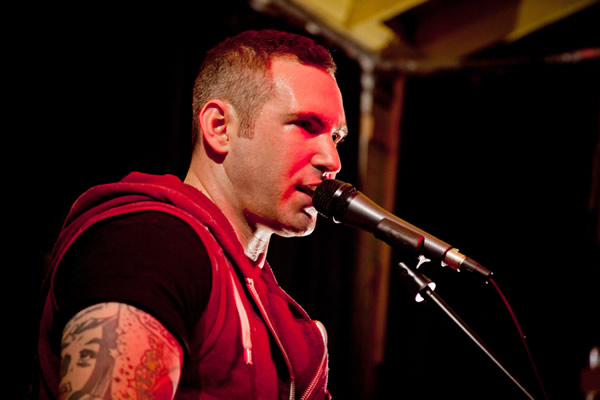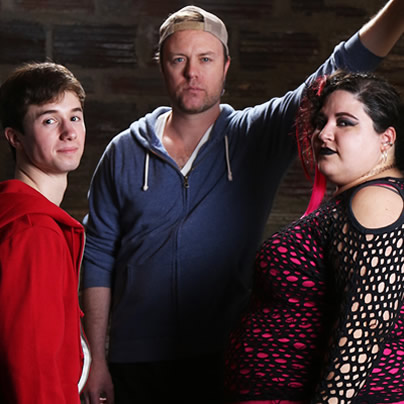Arts & Entertainment
Trans Pride slated for Saturday
Famous surgeon Marci Bowers to speak


Dr. Marci Bowers says gender reassignment surgery isn’t as traumatic as many fear. Complications, she says, are extremely rare, patients are in the hospital an average of only three nights and most are off pain medication within 48 hours. (Photo courtesy of Bowers)
Dr. Marci Bowers is a rarity — she’s one of only two doctors who specializes in gender reassignment surgery who’s also transgender herself. The other (Dr. Christine McGinn) is a protégé of Bowers.
Bowers, who transitioned in the mid-1990s, is the only gynecologist who does gender reassignment surgery. She’ll be at Trans Pride Saturday (10 a.m. to 5 p.m. at Metropolitan Community Church of Washington) to give the keynote address and took nearly an hour on the phone last week from her practice in San Mateo, Calif., to talk about her life, her work, the practicalities of trans surgical procedures and where trans issues are going. Bowers’ comments have been edited for length and clarity.
Blade: How does a surgeon trained in one area move to another? What kind of training is involved?
Bowers: Well sometimes people think when you’re a gynecologist all you do is look at female vulvas all day but it’s quite a surgical specialty. There’s extensive surgery experience required before learning the gender reassignment stuff. And after I’d been doing surgery in practice for 13 years or so, once you have a basic framework about handling tissue ane bleeding, learning a new skill isn’t as hard as it might seem.
Blade: So if someone does, say, gall bladder surgeries and wants to start doing heart transplants, what’s the process like to move to a whole other part of the body?
Bowers: Traditionally you have to do a fellowship of some kind to do that. You have to go back, reapply as if you’re just out of medical school, do a residency all over again in the new field and go from there. They might give you a little credit on a few things, but you pretty much have to start back at the beginning. It was different for me because there’s no residency or fellowship for doing gender reassignment surgeries and I had a lot of experience surgically so doing an entire residency for me would have been ridiculous and superfluous. It’s really a mentoring process and I learned from Dr. (Stanley) Biber.
Blade: Does it give you added credibility to be doing these surgeries but also be transgender yourself?
Bowers: Well, I think that’s really for the consumer to decide that, but I think so. It’s sort of like the hair club for men. Not only am I president, I’m also a customer. Someone who understands what it’s like to be bald. Or like if you’re selling sports cars but you drive a minivan. I know what the consumer is looking for but I think being a gynecologist is the most important. Because it’s a very visual surgery and very artistically based. If someone has a gall bladder out and there are no complications, nobody cares what it looked like but this surgery has such an artistic component, the surgeon’s interpretation is so critical.
Blade: Many trans people say the non-trans world is too obsessed with who’s had what done surgically. Do you agree?
Bowers: That’s a crucial point and one that I keep bring up proactively because obviously people still don’t understand the difference between gender and genitalia. Gender, we know, gets established at a very early age, like by age 4, 5 or 6 and it doesn’t really change very much. This is what transgender people have been saying for years, “This is how I felt since I was 5 years old.” So the question about surgery is really the dumbest question. … I was a woman since I transitioned. Nobody tells you whether you’re male or female. And it isn’t about the surgery, it’s what society says when they meet you at the grocery store or the food counter.
Blade: Trans acceptance seems to be making progress but still seems significantly behind gay and lesbian lib. Do you agree with that? Do you think it will continue to improve?
Bowers: Well, yes, I do think we are behind where the lesbian and gay community is in terms of acceptance. Some of that is just the sheer numbers, some of it is it’s still a little bit of a minority sort of thing and somehow it does sort of push people’s buttons in a different way. That’s too bad because if the gay and lesbian community saw the trans community as more supportive, we could make much more progress but sometimes the discrimination we get within the gay and lesbian community is worse than it is with the straight community. It’s like they just don’t get it and it’s very hurtful. There are common threads that run through all kinds of discrimination. We’re fighting the same forces that want to simplify the world and turn back the clock so everything is black and white and keep dragging at the heels of progress.
Blade: What kinds of procedures do you do? All “bottom” stuff or more?
Bowers: Kind of bottom plus. I do a procedure on the females, Chondrolaryngoplasty, which is a shaving of the thyroid cartilage. For some women, it’s a telltale sign in the throat and it was first done by Dr. Biber in the 1970s. It’s also a very delicate procedure that’s not taught anywhere, no ear, nose or throat doctors do it. It’s a very specialized thing.
Blade: And you do both male-to-female and female-to-male gender reassignment procedures?
Bowers: Yes.
Blade: Which are more common? How many do you average in a year?
Bowers: I do about 120 male-to-female surgeries a year. It’s about four-to-one female to male versus male to female.
Blade: Are most people able to orgasm after surgery?
Bowers: It’s different. For female to male, there’s really no impact. With a Metoidioplasty, guys can use it for penetration so that’s the good part there. If anything, it’s enhanced. Plus the fact that they’re testosterone-driven men, the libido tends to accelerate with transition. With male to female, it’s very complicated and about 30 percent of biologically born women aren’t able to orgasm at all anyway. Our patients for the most part are able to. It’s a very high percentile. About 90 percent but the thing you have to realize is that going from male to female for one thing, just hormonally, you tend to go to a lower level of interest just based on reduced testosterone levels. When you’re a woman, you wonder why we leave men in charge of so much. It’s so dominated by sexual thoughts. Sometimes I think, “Wow, what was I thinking about all those years? There’s so much more to do.” I say that sort of tongue in check. And the feelings are a big different. Maybe like going from the oboe to the banjo.
Trans Pride to feature health focus
Trans Pride, now in its fifth year, will be held Saturday at Metropolitan Community Church of Washington (474 Ridge Street, N.W.) from 10 a.m. to 5 p.m. and is designed to be an event where attendees stay for all or most of the day.
“Very early on, the community voted for it to be a health-based focus,” says Danielle King, who’s co-charing this year’s event with Holly Goldmann. “That’s why Dr. Bowers was invited. We felt like she could offer some insight that would be really attractive to our audience.”
A $10 donation is suggested but not required. King hopes attendees will plan to spend their whole day at the church.
“We want them to come and enjoy the whole day,” she says. “There’ll be workshop and panel discussions on trans health throughout the day.”
She expects about 200 people, more than in past years when the event has been held at the Capital Pride host hotel.
Trans Pride is under the Capital Pride events umbrella.
Photos
PHOTOS: Montgomery County Pride in the Plaza
LGBTQ celebration held in downtown Silver Spring

Montgomery County Pride in the Plaza was held on Sunday, June 29 at Veterans Plaza in Silver Spring, Md.
(Washington Blade photos by Michael Key)























The fifth annual Fredericksburg Pride march and festival was held on Saturday, June 28. A march through the streets of downtown Fredericksburg, Va. was followed by a festival at Riverfront Park.
(Washington Blade photos by Michael Key)



















India
Anaya Bangar challenges ban on trans women in female cricket teams
Former Indian cricketer Sanjay Bangar’s daughter has received support

Anaya Bangar, the daughter of former Indian cricketer Sanjay Bangar, has partnered with the Manchester Metropolitan University Institute of Sport in the U.K. to assess her physiological profile following her gender-affirming surgery and undergoing hormone replacement therapy.
From January to March 2025, the 23-year-old underwent an eight-week research project that measured her glucose levels, oxygen uptake, muscle mass, strength, and endurance after extensive training.
The results, shared via Instagram, revealed her metrics align with those of cisgender female athletes, positioning her as eligible for women’s cricket under current scientific standards. Bangar’s findings challenge the International Cricket Council’s 2023 ban on transgender athletes in women’s cricket, prompting her to call for a science-based dialogue with the Board of Control for Cricket in India and the ICC to reform policies for transgender inclusion.
“I am talking with scientific evidence in my hand,” Bangar said in an interview posted to her Instagram page. “So, I hope, this makes an impact and I will be hoping to BCCI and ICC talking with me and discussing this further.”
On Nov. 21, 2023, the ICC enacted a controversial policy barring trans women from international women’s cricket. Finalized after a board meeting in Ahmedabad, India, the regulation prohibits any trans player who has experienced male puberty from competing, irrespective of gender-affirming surgery or hormone therapy. Developed through a 9-month consultation led by the ICC’s Medical Advisory Committee, the rule aims to safeguard the “integrity, safety, and fairness” of women’s cricket but has drawn criticism for excluding athletes like Canada’s Danielle McGahey, the first trans woman to play internationally. The policy, which allows domestic boards to set their own rules, is slated for review by November 2025.
Bangar shared a document on social media verifying her participation in a physiological study at the Manchester Metropolitan University Institute of Sport, conducted from Jan. 20 to March 3, 2025, focused on cricket performance. The report confirmed that her vital metrics — including haemoglobin, blood glucose, peak power, and mean power — aligned with those of cisgender female athletes. Initially, her fasting blood glucose measured 6.1 mmol/L, slightly above the typical non-diabetic range of 4.0–5.9 mmol/L, but subsequent tests showed it normalized, reinforcing the study’s findings that her physical profile meets female athletic standards.
“I am submitting this to the BCCI and ICC, with full transparency and hope,” said Bangar. “My only intention is to start a conversation based on facts not fear. To build space, not divide it.”
In a letter to the BCCI and the ICC, Bangar emphasized her test results from the Manchester Metropolitan University study. She explained that the research aimed to assess how hormone therapy had influenced her strength, stamina, haemoglobin, glucose levels, and overall performance, benchmarked directly against cisgender female athletic standards.
Bangar’s letter to the BCCI and the ICC clarified the Manchester study was not intended as a political statement but as a catalyst for a science-driven dialogue on fairness and inclusion in cricket. She emphasized the importance of prioritizing empirical data over assumptions to shape equitable policies for trans athletes in the sport.
Bangar urged the BCCI, the world’s most influential cricket authority, to initiate a formal dialogue on trans women’s inclusion in women’s cricket, rooted in medical science, performance metrics, and ethical fairness. She called for the exploration of eligibility pathways based on sport-specific criteria, such as haemoglobin thresholds, testosterone suppression timelines, and standardized performance testing. Additionally, she advocated for collaboration with experts, athletes, and legal advisors to develop policies that balance inclusivity with competitive integrity.
“I am releasing my report and story publicly not for sympathy, but for truth. Because inclusion does not mean ignoring fairness, it means measuring it, transparently and responsibly,” said Bangar in a letter to the BCCI. “I would deeply appreciate the opportunity to meet with you or a representative of the BCCI or ICC to present my findings, discuss possible policy pathways, and work towards a future where every athlete is evaluated based on real data, not outdated perceptions.”
Before her transition, Bangar competed for Islam Gymkhana in Mumbai and Hinckley Cricket Club in the U.K., showcasing her talent in domestic cricket circuits. Her father, Sanjay Bangar, was a dependable all-rounder for the Indian national cricket team from 2001 to 2004, playing 12 test matches and 15 One Day Internationals. He later served as a batting coach for the Indian team from 2014 to 2019, contributing to its strategic development.
Cricket in India is a cultural phenomenon, commanding a fanbase of more than 1 billion, with more than 80 percent of global cricket viewership originating from the country.
The International Cricket Council, the sport’s governing body, oversees 12 full member nations and more than 90 associate members, with the U.S. recently gaining associate member status in 2019 and co-hosting the 2024 ICC Men’s T20 World Cup. The BCCI generated approximately $2.25 billion in revenue in the 2023–24 financial year, primarily from the Indian Premier League, bilateral series, and ICC revenue sharing. The ICC earns over $3 billion from media rights in India alone for the 2024–27 cycle, contributing nearly 90 percent of its global media rights revenue, with the BCCI receiving 38.5 percent of the ICC’s annual earnings, approximately $231 million per year.
Women’s cricket in India enjoys a growing fanbase, with over 300 million viewers for the Women’s Premier League in 2024, making it a significant driver of the sport’s global popularity. The International Cricket Council oversees women’s cricket in 12 full member nations and over 90 associate members, with the U.S. fielding a women’s team since gaining associate status in 2019 and competing in ICC events like the 2024 Women’s T20 World Cup qualifiers. The BCCI invests heavily in women’s cricket, allocating approximately $60 million annually to the WPL and domestic programs in 2024–25, while contributing to the ICC’s $20 million budget for women’s cricket development globally. India’s media market for women’s cricket, including WPL broadcasting rights, generated $120 million in 2024, accounting for over 50 percent of the ICC’s women’s cricket media revenue.
“As a woman, I feel when someone says that they are women, then they are, be trans or cis. A trans woman is definitely the same as a cis woman emotionally and in vitals, and specially, when someone is on hormone replacement therapy. Stopping Anaya Bangar from playing is discrimination and violation of her rights. It is really sad and painful that every transwoman need to fight and prove their identity everywhere,” said Indrani Chakraborty, an LGBTQ rights activist and a mother of a trans woman. “If ICC and BCCI is stopping her from playing for being transgender, then I will say this to be their lack of awareness and of course the social mindsets which deny acceptance.”
Chakraborty told the Blade that Bangar is an asset, no matter what. She said that the women’s cricket team will only benefit by participation, but the discriminating policies are the hindrance.
“Actually the transgender community face such discrimination in every sphere. In spite of being potent, they face rejection. This is highly inhuman. These attitudes is regressive and will never let to prosper. Are we really in 2025?,” said Chakraborty. “We, our mindset and the society are the issues. We, as a whole, need to get aware and have to come together for getting justice for Anaya. If today, we remain silent, the entire community will be oppressed. Proper knowledge of gender issues need to be understood.”
The BCCI and the International Cricket Council have not responded to the Blade’s repeated requests for comment.
-

 U.S. Supreme Court4 days ago
U.S. Supreme Court4 days agoSupreme Court upholds ACA rule that makes PrEP, other preventative care free
-

 U.S. Supreme Court4 days ago
U.S. Supreme Court4 days agoSupreme Court rules parents must have option to opt children out of LGBTQ-specific lessons
-

 Television5 days ago
Television5 days ago‘White Lotus,’ ‘Severance,’ ‘Andor’ lead Dorian TV Awards noms
-

 Music & Concerts5 days ago
Music & Concerts5 days agoBerkshire Choral to commemorate Matthew Shepard’s life









